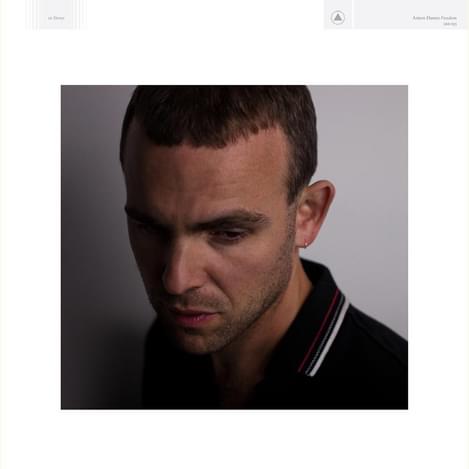Songs of innocence and experience make Amen Dunes’ Freedom a devastating listen
"Freedom"

Through Donkey Jaw was tonally very stark, and its palette limited, as though the entire piece was washed over with grey and black hues. From the grotesque cover art, it was clear that the record would be firmly within the Sacred Bones spectrum of sound – which is to say that McMahon’s label had established such a clear aesthetic that the album – from the first listen - seemed to be adhering to. The real surprise came when Donkey Jaw pushed against the ‘Sacred Bones sound’ on tracks like “Good Bad Dreams” and “Christopher”, which were by turns quite open and accessible. The rest of the record was largely built around skronking guitar noise and deliberately ugly sounds.
The trajectory towards the light really began on Love, where the album cover displayed the tone of the album as a rich blue horizon, and a naked woman casting a glance back over her shoulder towards the rising Sun. It was a perfect metaphor for the change in McMahon’s music: the watercolours were now light pinks, oranges, and blues. There was a distinct absence of black for the first time. It was (and remains) a vibrant, exuberant celebration of life and love – a trippy, wistful collection of star-gazing pop music.
Now, with the aptly-titled Freedom, we are presented with the man himself on the cover, fully exposed and out in the world. He looks at the ground but does not look sad. A white border frames his face. It’s also, lyrically, almost comically dark at points, with themes ranging from the existential to the boldly personal. This darkness rarely seeps into the music itself, which is gorgeous, mild and graceful. Mature, even.
The album opens with an “Intro”, which features two bewildering voices against a Spacemen 3-esque seasick, electronic drone. "This is your time!" a child shouts through the haze, then McMahon's mother (who was, sadly, diagnosed with terminal cancer when he began making the album) utters a quote from the painter Agnes Martin: "I don't have any ideas myself. I am a vacant mind."
“We play religious music / don’t think you understand” goes the mission statement from the opening track “Blue Rose”, and it’s clear that he means it. This Jim Morrison-esque bravado comes with a clear invitation to join in, to come onboard. The insistence of the rhythm immediately gives away the new changes brought in for Freedom. It’s clear that we’re dealing with a changed man, a changed sound. The trippy, druggy tones are still here – but rather than being hazy, textural backgrounds, the mystical aspects of the Amen Dunes sound are brought right into focus, bringing the overall effect of his music to near-transcendental levels. You can feel it.
The repetitive, cyclical nature of the following track, “Time”, may be a metaphor. But it’s certainly powerful without any baggage – the plucked guitar strings chime against McMahon’s reedy warble with a beautiful sense of synchronicity. The dark, Velvet Underground fug of “Miki Dora” has a rising, palpable sense of anticipation and a lyrical focus on the masculinity of the titular surfer. It’s a tease of epic proportions – the track has an endless sense of momentum and pays off just as it seems to be slipping away. A “Heroin” for modern times.
The industrial clang of “Skipping School” fits the urban noir of the lyrics: teenagers are sniffing glue and the narrator is contemplating staying high forever. At many points throughout the album, and with McMahon’s previous efforts, the listener is often left wondering just how much of himself he writes into the narrators of his tracks. Is it all autobiographical? Is it fantasy? “Calling Paul the Suffering” is one of the songs on the album that deals with issues surrounding father figures – we are led to believe that this is largely autobiographical, but it could realistically be completely removed from McMahon’s reality. It’s built around dull synthesizer humming and glossy guitars and some of the rawest, clearest vocals on the record. It’s almost as though McMahon wants us to hear, wants us to take it all in. Where previously his voice has been obscured, here it is open and upfront.
Epic album closer “L.A.” and the coal-black narrative of “Dracula” add further emphasis to the record, almost like exclamation marks. Both pieces revolve around the notion of toxic psychic melodrama of urban living – where the Hollywood Hills become Biblically imposing, and the titular vampire IS the narrator, who “used to run around / with the vampires uptown”.
The lyrics of “Believe” are very Bruce Springsteen, where the past was a simpler time and we’re all in it together and where McMahon’s mother tells him to “Keep steady, do it / Don’t stop, do it”. He draws on this sense of affirmation throughout the track, like a comfort blanket.
On the whole, Freedom represents a watershed moment for Damon McMahon. Sure, throughout his recording career he’s been on the hippest label, had glowing reviews and played with glamorous players, from Elias Bender Rønnenfelt on Love, to Nick Zinner here, but it’s never really been about record covers or guest stars or record labels. What Amen Dunes has managed to do, as a project, is demonstrate the mental (psychic?) evolution of all humans, from the devastation of youth to the calmness and acceptance of age. Damon McMahon isn’t young or angry any more, he’s become the guiding light that the angry young man of his early work always needed. He has written an album that shows that when all feels lost, there’s still time to make it right. That’s wisdom, that’s true Freedom.
Get the Best Fit take on the week in music direct to your inbox every Friday

Tunde Adebimpe
Thee Black Boltz

Julien Baker & TORRES
Send A Prayer My Way

Bon Iver
SABLE, fABLE





